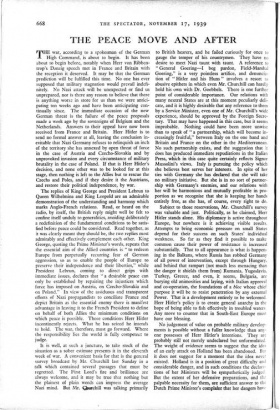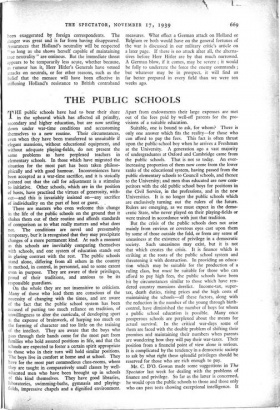THE PEACE MOVE AND AFTER
THE war, according to a spokesman of the German High Command, is about to begin. It has been about to begin before, notably when Herr von Ribben- trop's Danzig speech met in France and Britain with the reception it deserved. It may be that the German prediction will be fulfilled this time. No one has ever supposed that military stagnation would prevail indefi- nitely. No Nazi attack will be unexpected or find us unprepared, nor is there any reason to believe that there is anything worse in store for us than we were antici- pating ten weeks ago and have been anticipating con- tinually since. The immediate occasion of the new German threat is the failure of the peace proposals made a week ago by the sovereigns of Belgium and the Netherlands. Answers to their appeal have now been received from France and Britain. Herr Hitler is to send no formal answer at all, leaving the conclusion in- evitable that Nazi Germany refuses to relinquish an inch of the territory she has annexed by open threat of force in the case of Austria and Czecho-Slovakia and by unprovoked invasion and every circumstance of military brutality in the case of Poland. If that is Herr Hitler's decision, and none other was to be looked for at this stage, then nothing is left to the Allies but to rescue the Czechs and Poles, and if they desire it the Austrians, and restore their political independence, by war. The replies of King George and President Lebrun to Queen Wilhelmina and King Leopold are an admirable demonstration of the understanding and harmony which marks Anglo-French relations. Read, or heard on the radio, by itself, the British reply might well be felt to confine itself unduly to generalities, avoiding deliberately a redefinition of the fundamental conditions to be satis- fied before peace could be considered. Read together, as it was clearly meant they should be, the two replies most admirably and effectively complement each other. King George, quoting the Prime Minister's words, repeats that the essential aim of the Allied countries is " to redeem Europe from perpetually recurring fear of German aggression, so as to enable the people of Europe to preserve their independence and their liberties," while President Lebrun, coming to direct grips with immediate issues, declares that " a desirable peace can only be established by repairing the injustices which force has imposed on Austria, on Czecho-Slovakia and on Poland." In view of the assiduous and transparent efforts of Nazi propagandists to conciliate France and depict Britain as the essential enemy there is manifest advantage in leaving it to the French President to define on behalf of both Allies the minimum conditions on which peace is possible. Those conditions Herr Hitler incontinently rejects. What he has seized he intends to hold. The war, therefore, must go forward. Where the responsibility lies the world is fully competent to judge.
It is well, at such a juncture, to take stock of the situation as a sober estimate presents it in the eleventh week of war. A convenient basis for that is the general survey broadcast by Mr. Churchill last Sunday in a talk which contained several passages that must be regretted. The First Lord's fire and brilliance are always welcome, and it may be true that nothing but the plainest of plain words can impress the average Nazi mind. But Mr. Churchill was talking primarily to British hearers, and he failed curiously for once to gauge the temper of his countrymen. They have no desire to meet Nazi taunt with taunt. A reference to " General Goering—I beg pardon, Field-Marshal Goering," is a very pointless artifice, and denuncia- tion of " Hitler and his Huns " involves a resort to abusive epithets in which even Mr. Churchill can hardly hold his own with Dr. Goebbels. There is one further point of considerable importance. Our relations with many neutral States are at this moment peculiarly deli- cate, and it is highly desirable that any reference to them by a Service Minister, even one of Mr. Churchill's wide experience, should be approved by the Foreign Secre- tary. That may have happened in this case, but it seems improbable. Nothing could have been more unwise than to speak of " a partnership, which will become in- creasingly fruitful," between Italy on the one hand and Britain and France on the other in the Mediterranean. No such partnership exists, and the suggestion that it does has produced immediate repudiations in the Italian Press, which in this case quite certainly reflects Signor Mussolini's views. Italy is pursuing the policy which she believes best serves her interests. In spite of her ties with Germany she has declared that she will take no military initiative. But she is in no sort of partner- ship with Germany's enemies, and our relations with her will be harmonious and mutually profitable in pro- portion as we recognise that she is keeping her hands entirely free, as she has, of course, every right to do. Subject to those reservations, Mr. Churchill's survey was valuable and just. Politically, as he claimed, Herr Hitler stands alone. His diplomacy is active throughout Europe, but nowhere is it achieving visible results. Attempts to bring economic pressure on small States depend for their success on such States' individual weakness. So far as they find it possible to make common cause their power of resistance is increased substantially. That to all appearance is what is happen- ing in the Balkans, where Russia has robbed Germany of all power of intervention, except through Hungary, and behind that rampart (not much less menacing than the danger it shields them from) Rumania, Yugoslavia, Turkey, Greece, and even, it seems, Bulgaria, are burying old animosities and laying, with Italian approval and co-operation, the foundations of a bloc whose chief purpose it will be to resist penetration by any external Power. That is a development entirely to be welcomed. Herr Hitler's policy is to create general anarchy in the hope of being able to fish effectively in troubled waters. Any move to counter that in South-East Europe must have our blessing.
No judgement of value on probable military develop- ments is possible without a fuller knowledge than any- one possesses of Herr Hitler's intentions. They are probably still not merely undeclared but unformulated. The weight of evidence seems to suggest that the ides: of an early attack on Holland has been abandoned. But it does not suggest for a moment that the idea never existed. Holland is in a position of great difficulty and considerable danger, and in such conditions the declara- tions of her Ministers will be sympathetically judged and the But the extent of her defensive preparations, palpable necessity for them, are sufficient answer to the Dutch Prime Minister's complaint that her dangers have been exaggerated by foreign correspondents. The danger was great and is far from having disappeared. Assurances that Holland's neutrality will be respected " so long as she shows herself capable of maintaining true neutrality " are ominous. But the immediate threat appears to be temporarily less acute, whether because, as rumour has it, Herr Hitler's Generals have vetoed attacks on neutrals, or for other reasons, such as the belief that the menace will have been effective in stiffening Holland's resistance to British contraband measures. What effect a German attack on Holland or Belgium or both would have on the general fortunes of the war is discussed in our military critic's article on a later page. If there is no attack after all, the alterna- tives before Herr Hitler are by that much narrowed. A German blow, if it comes, may be severe ; it would be folly to underrate the force the enemy commands ; but whatever may be in prospect, it will find us far better prepared in every field than we were ten weeks ago.





































































 Previous page
Previous page